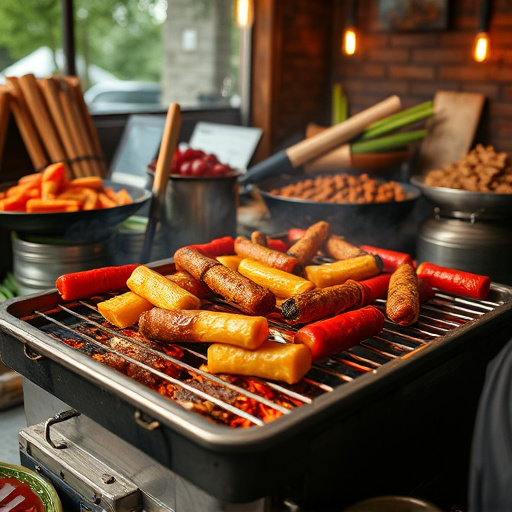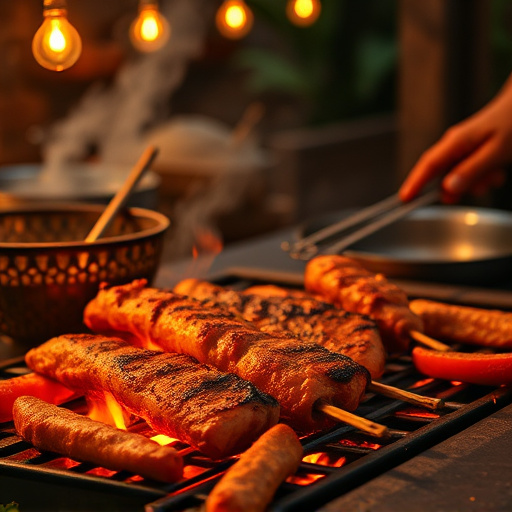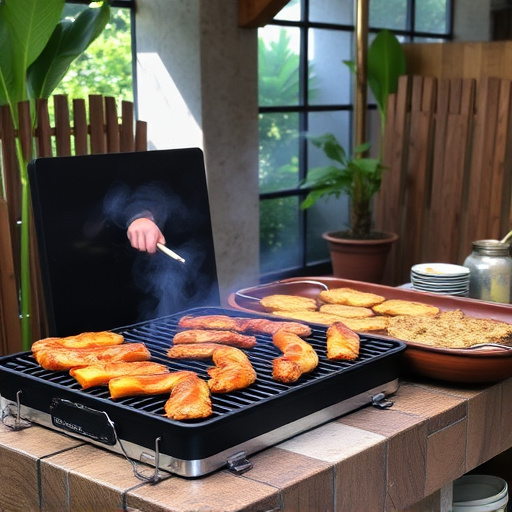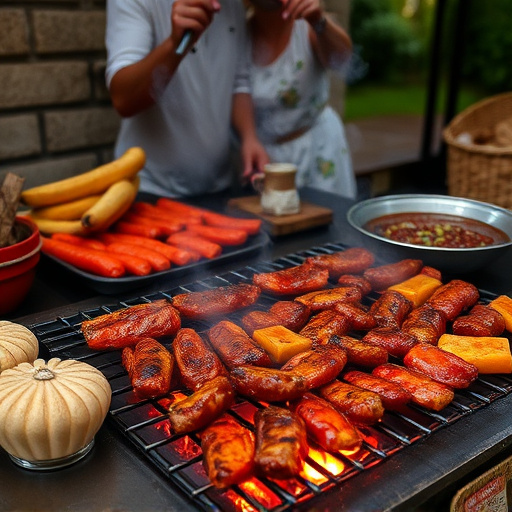Crafting the perfect grilled BBQ chicken recipe involves using fresh, high-quality bone-in, skin-on cuts for maximum juiciness and flavor. Start with a marinade blend of oil, acid (lemon/vinegar), garlic, herbs, salt & pepper to break down proteins and add depth. Techniques like marinating with acids or dry rubs help retain moisture. Marinate 2-4 hours or overnight in a sealed container. Grill using direct and indirect heat for a crispy exterior and consistent cooking.
Unleash the ultimate summer delight with this simple guide to creating mouthwatering, juicy grilled BBQ chicken. Discover the secrets to selecting the perfect cut of chicken and mastering the art of marination with a focus on flavor and moisture retention. From choosing the right base ingredients to grilling techniques, transform ordinary chicken into a tender, flavorful masterpiece. Elevate your BBQ game with this easy-to-follow recipe and impress your taste buds!
- Selecting the Right Chicken for BBQ Marinade
- Base Ingredients for a Flavorful Marinade
- Techniques to Lock in Moisture and Juiciness
- Grilling Tips for Perfectly Marinated Chicken
Selecting the Right Chicken for BBQ Marinade

When it comes to selecting the perfect chicken for your grilled BBQ marinade, start with fresh, high-quality chicken breasts or thighs. Look for meat that is tender and has good marbling—this means small flecks of fat throughout the muscle, which will help keep the chicken juicy during cooking. Avoid overly lean cuts, as they can become dry when grilled. Opting for bone-in, skin-on parts, such as whole breasts or thighs with the bone and skin intact, is ideal because the bone helps retain moisture, and the skin crisps up deliciously over the flame. Additionally, these cuts offer a better flavor profile than boneless, skinless options, making them the top choice for a mouthwatering grilled BBQ chicken recipe.
Base Ingredients for a Flavorful Marinade

When crafting a marinade for juicy grilled BBQ chicken, start with a blend of essential base ingredients that create a flavor profile worth salivating over. Olive oil or vegetable oil serves as the perfect carrier, ensuring your chicken stays tender and infused with flavors. Combine this with a balanced mix of acidity, usually in the form of lemon juice or vinegar, which helps break down proteins and adds that tangy zing.
For a robust taste, incorporate garlic and herbs—fresh rosemary, thyme, or oregano—alongside a touch of salt and pepper. These aromatic elements bring depth and complexity to your grilled BBQ chicken recipe, transforming an ordinary meal into a culinary delight. Don’t be afraid to experiment with quantities; the beauty of marinades lies in customization, allowing you to tailor the flavor precisely to your preference.
Techniques to Lock in Moisture and Juiciness

To ensure your grilled BBQ chicken recipe turns out juicy and tender, mastering moisture retention techniques is key. One effective method is to marinate your chicken thoroughly before grilling. Acidic ingredients like lemon juice or vinegar penetrate the meat, breaking down proteins and preventing them from tightening during cooking. This step not only enhances flavor but also creates a protective layer that seals in natural juices.
Additionally, using dry rubs or adding herbs and spices directly onto the chicken can help lock in moisture. The aromatics not only add depth to the BBQ chicken’s taste but also act as a barrier, slowing down the escape of water from the meat as it cooks. This combination of marinades and seasoning ensures your grilled BBQ chicken remains juicy and flavorful throughout the grilling process.
Grilling Tips for Perfectly Marinated Chicken

Achieving juicy, perfectly grilled BBQ chicken starts with a robust marinade. A good marinade not only adds flavor but also helps to break down proteins, ensuring your chicken is tender and succulent. When marinating, allow enough time – typically 2-4 hours, or even overnight for extra depth of flavor. Use a sealed container to prevent the marinade from drying out.
During grilling, remember that direct heat sears the surface, creating a crispy exterior while locking in juices. Indirect heat can be used for slower cooking, allowing for more tender meat. Keep an eye on your grill temperature and adjust as needed. For best results, preheat your grill before adding the chicken and maintain a consistent heat throughout the cooking process.
